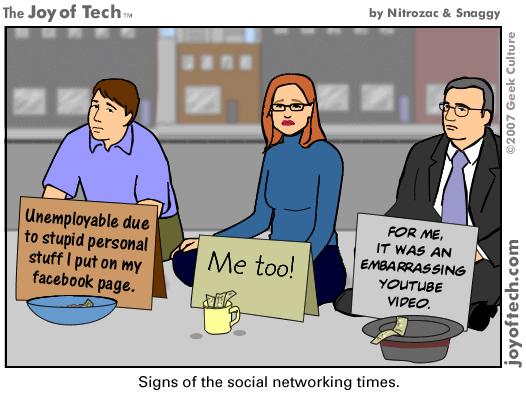I’m puzzling over the recent brouhaha regarding Facebook’s changes to their privacy policy. To be clear: I’m not puzzling over the changes (though they are confusing to the user who just wants to use the service instead of thinking about its internal minutia) – I’m puzzling over the concern about them.
 Blogs are 100% public. Twitter is 100% public. Posting on newsgroups and forums is 100% public. The web in general is a public space. I’m wondering WHY there are such dramatically different expectations on Facebook than everywhere else. Fine-grained control over exactly who gets to see exactly what? All of this comes down to a single problem: Millions of people apparently want to have a web presence and yet be private at the same time. Everywhere else online, it’s one or the other.
Blogs are 100% public. Twitter is 100% public. Posting on newsgroups and forums is 100% public. The web in general is a public space. I’m wondering WHY there are such dramatically different expectations on Facebook than everywhere else. Fine-grained control over exactly who gets to see exactly what? All of this comes down to a single problem: Millions of people apparently want to have a web presence and yet be private at the same time. Everywhere else online, it’s one or the other.
For me, it’s simple: If what you have to say shouldn’t be said to the whole world, then don’t say it online. In other words, the basic assumption is wrong to begin with. Facebook is trying to give you the sense that you can post online and control your privacy at the same time. It doesn’t work.
Actually, this problem isn’t limited to the web. When you walk down the street, you’re on public display. You don’t pick your nose in public because… well, you just don’t. You don’t need to be told that that’s something you do in private. If you have something private to say to someone, you whisper in their ear, or you call them. Or you email them. Don’t post it where others can see it.
The idea that I should be able to play online but not have to worry that my thoughts are completely public just seems… unrealistic. How many stories have you read about people being fired or worse over comments they’ve made on Facebook? Did their privacy settings protect them? No – things get out. The problem is not Facebook’s new privacy settings, but an epidemic of oversharing. It’s a problem that should be solved the same way we solve it in the real world – by being discrete – not by adding more dials and levers to our interactions.

Then there’s the question of reach. In general, people want to be heard. They pay close attention to the number of Facebook Friends or Twitter followers they currently have. Bloggers watch their traffic logs obsessively. Why? Because they want their thoughts to be heard as widely as possible. Guess what gives your thoughts the widest possible reach? Completely open platforms with no concept of privacy, like Twitter, blogs, and forums. In those spaces, it’s up to the user not to broadcast things they don’t want the whole world to see.
I’m personally glad that Facebook is gradually nudging users to share more content publicly, putting the brakes on this expectation that people can post online but not be public. When was the last time a Facebook post showed up in your Google search results? OK granted, I wouldn’t want most Facebook posts polluting my search results (there’s a whole lot of noise out there), but there’s also a lot of great content locked away behind the “privacy” firewall that really should be part of the public web — which is built on concepts of openness and transparency.
The fact that only people who “friend” me can see my content on Facebook is an annoyance to me, not a feature I cherish and wring my hands over. My dream “privacy” preference for Facebook would be a simple checkbox option reading “I acknowledge that I’m writing stuff on the web. Treat my content as such.”
Update 01/04: In an interview in front of a live audience, Facebook founder Mark Zuckerberg says if he were starting all over again, he’d make everyone’s information public. Because that is the “social norm.”


 Blogs are 100% public. Twitter is 100% public. Posting on newsgroups and forums is 100% public. The web in general is a public space. I’m wondering WHY there are such dramatically different expectations on Facebook than everywhere else. Fine-grained control over exactly who gets to see exactly what? All of this comes down to a single problem: Millions of people apparently want to have a web presence and yet be private at the same time. Everywhere else online, it’s one or the other.
Blogs are 100% public. Twitter is 100% public. Posting on newsgroups and forums is 100% public. The web in general is a public space. I’m wondering WHY there are such dramatically different expectations on Facebook than everywhere else. Fine-grained control over exactly who gets to see exactly what? All of this comes down to a single problem: Millions of people apparently want to have a web presence and yet be private at the same time. Everywhere else online, it’s one or the other. 